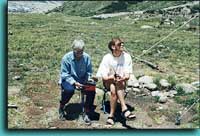Summer arrives and Andrei Volkov goes to the mountains. It is his sixteenth season. Andrei
says that it is the longest business in his life. It's of no sense to ask a climber why he
climbs mountains. It is clear as a noonday. But there should be reasons why does he choose
one mountain in many. This time it was Nanga Parbat. |

Luba Shvedova and Andrei Volkov in the Nanga Parbat base camp
|
|
Volkov: "Compared to other eight-thousanders, this mountain was surrounded by the
aura of mystery for me. There were no Russians there. Nobody in Russia had any information
about this mountain. There was a restricted access to this mountain for foreigners because
of a conflict between India and Pakistan apropos of Jammu and Kashmir territories.
Moreover, the mountain is very closely located (approximately 40 kilometers) to this
region. The government simply hasn't issue climbing permits for foreigners for a long
time, approximately 15 years. During this time all the other 8,000 meter peaks were
summitted and most of new routes were pushed. So, from early seventies to mid eighties,
the mountain was inaccessible. |
The second reason is that Nanga Parbat had bad reputation. It had the highest rate of
deaths among summiters. 49 people were died its slopes. Later, K2 successfully surpassed
this number... During the developing period, two German expeditions ended up with an awful
tragedy. This romantic aura around this mountain was attractive for me. It was mysterious,
none of our colleagues had been there and it was an entirely different region for us.
There are no more 8,000 meter peaks in this area, it stands alone as the conclusion to the
Himalayas.
There is one more reason: the mountain seemed to be technically accessible. Last year we
got advice from Krzysztof Wielicki that Nanga Parbat is very accessible, you can reach it in three
days. This determined my choice of the mountain.
Our last motive was the political situation. It was much easier for us to organize the
expedition and to persuade people that are external to mountaineering to finance the
expedition. To be the first Russians on such an eight-thousander - that resonates! We were
the first Russian expedition to summit the Everest, the first on K2, now we had the
opportunity to be the first on Nanga Parbat. It was a kind of a fine logic or
scheme".
| |
|

